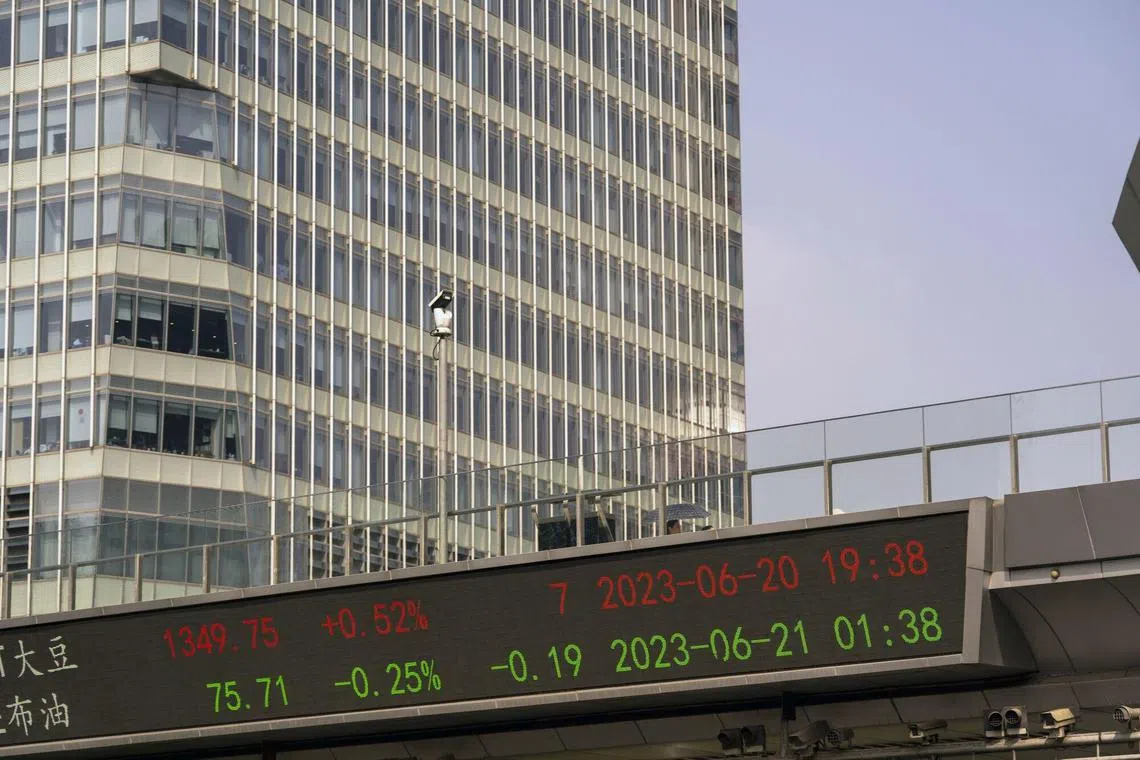Regulatory logjam in China offshore listings hits firms' funding plans
Sign up now: Get ST's newsletters delivered to your inbox

Scrutiny of proposals has intensified under new Chinese listing rules, frustrating potential issuers and investment bankers.
PHOTO: BLOOMBERG
Follow topic:
SYDNEY/HONG KONG - Chinese companies are finding it challenging to get timely regulatory approvals for overseas share offerings as scrutiny of their proposals has intensified under new listing rules, frustrating potential issuers and investment bankers.
Since the launch of the overhauled listing regime on March 31, not a single Chinese company has gone through the process and successfully listed in their favoured destination of either Hong Kong or the United States, publicly available data showed.
The trend underscores mounting challenges for Chinese companies looking to raise capital offshore even as an unprecedented regulatory crackdown on private enterprises over the past three years has ebbed and Beijing is looking to shore up its economy.
China’s long-awaited rules for offshore stock exchange listings form part of a regulatory tightening on cross-border listings after years of a laissez-faire approach.
The Chinese securities regulator has accepted offshore listing filings from 14 companies as at June 15, and is awaiting additional documents from 38 other companies for their filings to be accepted, public disclosures showed.
Of the 52 planned listings, as many as 43 are for Hong Kong and nine are for the US.
Only two companies – self-driving technology firm iMotion Automotive Technology (Suzhou) and food company Shiyue Daotian Group – have successfully completed their listing filings with the securities regulator to float shares in Hong Kong, according to the disclosures.
However, the two have yet to go public.
Under the new regime, the waiting time for approval from the China Securities Regulatory Commission (CSRC) for offshore listings has increased to at least six months from the earlier two to three months, said a Hong Kong-based capital markets lawyer.
Only companies from selective industries are able to win the CSRC’s approval to list offshore, said the lawyer, declining to be named as he was not authorised to speak to the media.
The CSRC did not respond to a request for comment.
Among those awaiting CSRC’s green light are JD.com’s property and industrial units, which the online retailer planned to float in Hong Kong as soon as possible in what could be a US$1 billion (S$1.35 billion) deal each, people with knowledge of the two initial public offerings (IPOs) said.
JD.com was hoping to list at least one of the units by the middle of the year, said one of the people.
The earliest the IPOs can happen now is the third quarter, given the pending approvals, the sources said.
CSRC disclosures showed the listing filings of the two units are pending “additional materials”.
JD.com did not respond to a request for comment.
The new listing regime requires CSRC to respond within 20 working days upon accepting an issuer’s listing filing.
If the regulator deems the filing incomplete, it can ask an issuer to submit additional documents within five days of receiving the filing, and an issuer will need to respond within 30 days.
Submitting additional materials can be time-consuming and thus delay the listing process, said bankers and lawyers.
A banker said the approval process has become a “black box”, as the CSRC also needs comments from other industry supervisory bodies before making a decision, and in most cases it is not clear which part of the process the application gets stuck in.
On Tuesday, Asia’s largest financial lobby group told Reuters the new rules have left bankers and lawyers who work on listings unsure how to take on liabilities and avoid breaching tightened confidentiality rules.
The regulatory logjam in the mainland is taking place even as Hong Kong is making it easier for companies to list.
The Hong Kong Exchanges and Clearing said on Wednesday that it will launch a new IPO settlement platform to improve efficiency by shortening the period between pricing of an IPO and trading of shares to two days.
The platform, Fini – or fast interface for new issuance – will reduce the settlement period from five days to two days, and will be rolled out in October.
IPO sponsors, underwriters, legal advisers, banks, clearing participants, share registrars and regulators will be able to collaborate and perform their respective roles in an IPO digitally on cloud-based Fini, the exchange said.
The platform also has a new public offer pre-funding model designed to help alleviate large sums of funds being locked up in oversubscribed IPOs. REUTERS

